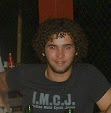In line with another post, here I present yet another movie concerning the concept of reasonable doubt, this time in the USA judiciary system. This particular movie is not concerned with the doubt as a driving force in the quest for truth, akin to the Cartesian method, but with the doubt as a halting mechanism, to call off any judgments once we've become aware of the intrinsic faults in our reasoning based on evidence.
12 Angry Men is a 1957 film to remember. Old fashion black and white, yes. But nothing in the aesthetical composition of the film will raise any eyebrow in a modern audience. At least, it shouldn't. It is all about full engagement in a logical (and psychological) debate and its smooth evolution towards a turning point. On the one hand, it leaves no time for distractions. One has to fully focus on dialogues. And on the other hand, it deals with universal and timeless topics, such as how to face preconceptions and the ethical need for expressing our own (and exposing other's) uncertainties in human affairs. 1957 and 2017 are fairly the same year in this sense.
A 12 men jury has to decide unanimously a verdict towards a defendant tacitly considered guilty. One of the 12 is not sure, though...
I leave you with a glimpse into the movie. Enjoy!
12 Angry Men is a 1957 film to remember. Old fashion black and white, yes. But nothing in the aesthetical composition of the film will raise any eyebrow in a modern audience. At least, it shouldn't. It is all about full engagement in a logical (and psychological) debate and its smooth evolution towards a turning point. On the one hand, it leaves no time for distractions. One has to fully focus on dialogues. And on the other hand, it deals with universal and timeless topics, such as how to face preconceptions and the ethical need for expressing our own (and exposing other's) uncertainties in human affairs. 1957 and 2017 are fairly the same year in this sense.
A 12 men jury has to decide unanimously a verdict towards a defendant tacitly considered guilty. One of the 12 is not sure, though...
I leave you with a glimpse into the movie. Enjoy!

Comments
Post a Comment